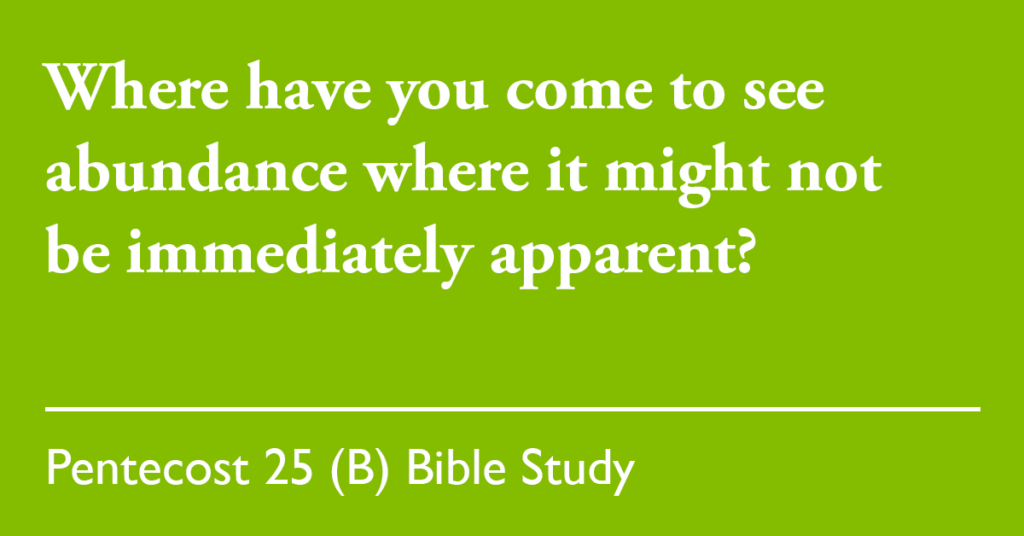Bible Study: Proper 27 (B) – 2024
November 10, 2024
RCL: 1 Kings 17:8-16; Psalm 146; Hebrews 9:24-28; Mark 12:38-44

1 Kings 17:8-16
In this text, Elijah has been sent to Zarephath, and in this place he encounters a widow. He finds her at the gate, making her both literally and figuratively in the margins of society. In 1 Kings a continual theme is that God overcomes drought and famine to assert power over the natural world, in such a way that questions the sensibilities of the people. This is no different. Elijah speaks to the widow and asks her to feed him, and she explains that she has such little food that after eating it with her son, they would still die. Elijah empowers her and sends her to feed the three of them, with the promise that she can, through the power of God, offer this meal. Not only does he ensure that they will be fed once, but he also ensures that the jar of meal will not empty until God’s power is shown to the earth in the form of the end of the drought. Elijah brings to the widow a prophecy of abundance in a scarce land. Where the world may offer death, Elijah promises that God offers the provisions that ensure life.
Discussion Questions from STW
- Where have you come to see abundance where it might not be immediately apparent?
- Have you ever experienced this kind of divine intervention?
Psalm 146
This psalm sings praises to Yahweh, while also in the third verse juxtaposing the power of God to the power of earthly rulers. The psalm proclaims, “Do not put your trust in princes, in mortals, in whom there is no help.” The psalm continues by taking readers back to the first showing of God’s power, creation, in verse five. The exclamation of the power of God shown in creation gives way to praise of God’s power on earth, a power shown through the means of justice for the oppressed and food for the hungry. To show the far-reaching extent of God’s power over the world God has created, God is defined as a God who sets prisoners free, heals people of their earthly infirmities, welcomes the stranger, shows compassion toward the orphan and the widow and defends the faithful people of God.
Discussion Questions from STW
- Have you ever experienced God working through you or your community? If so, when?
- What does it mean that the ruler of the universe, who set the stars in the sky, wants also to be known as a helper to those society often forgets?
Hebrews 9:24-28
In this reading from Hebrews, the reader is reminded of the power of the life, death and resurrection of Christ, which has offered grace to creation: past, present and future. Christ “did not enter a sanctuary made by human hands,” because the power of God is not from this world. Christ was present before God in God’s kingdom, and from that place intercedes for us, by offering us the power and presence of God-in-Christ. The work of God through Christ has transcended time and ended death. Death was ended not only for Christ, who was resurrected, but for the whole of humanity, because God has promised a savior who is sent “to save those who are eagerly waiting for him.”
Discussion Questions from STW
- Have you considered that, even though all buildings pale in comparison to the presence of God, that your congregation’s sanctuary could be patterned on paradise? What does that tell us about heaven? What does that tell us about our meeting places?
Mark 12:38-44
In this text, the writer of Mark juxtaposes a story about the hypocrisy and false witness of the scribes with a story of a widow who gives her most honest offering. In verses 38-41, Jesus teaches against those who serve God, yet reap earthly rewards for doing so. This seems to go along with Jesus’ teaching that the first in the kingdom of God shall be last, and the last shall be first. The “places of honor at the banquets” are not for the people of God; the people of God are last on earth, and ushered first into the kingdom of Heaven. Earthly authority has no bearing on whether or not a person will receive the glory of God on the last day. Continuing in verse 41, the gospel writer tells the story of a poor widow giving a penny, which is “everything she had, all she had to live on.” Again, like in the reading from 1 Kings, the power of God takes a place of scarcity and transforms it into an offering of abundance. The widow is faithful, and she doesn’t give out of scarcity, she gives out of the abundance that she believes will come to pass through the faithfulness and power of God.
Discussion Questions from STW
- We frequently hear the suggestion that Christians give of their time, talent, and treasure to serve God and neighbor. The widow teaches us well to give treasure when we have only a little; does the same teaching hold up in terms of time and talent, both of which might be limited in our lives?
Don’t forget to subscribe to the Sermons That Work podcast to hear this sermon and more on your favorite podcasting app! Recordings are released the Thursday before each liturgical date.
Receive Free Weekly Sermons That Work Resources!


